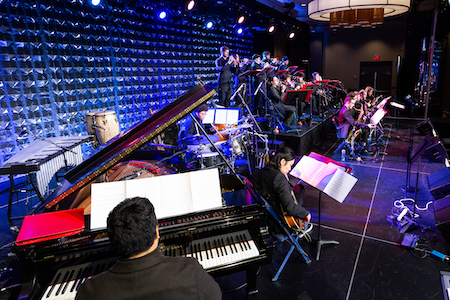Jan 13, 2026 2:09 PM
More Trump-Kennedy Center Cancellations
The fallout from the renaming of the John F. Kennedy Center for the Performing Arts to include President Donald…

Philadelphia’s University of the Arts “Z” Big Band.
(Photo: Courtesy University of the Arts)In creating the DownBeat College Guide each year, a great deal of thought goes into what students and parents need to know when selecting the right school. Over the years, we’ve come up with a formula that seems most effective.
Student Body: For most entries, we break it down by the school, then the music school and how many jazz students. Some students want the major university or big music school experience, while others want it small and personal.
Tuition: Maybe that should be No. 1. The cost of college is truly a challenge in this day and age. We get it.
Jazz Degrees: Bachelor of Music (BM throughout the guide); Bachelor of Arts (BA), Master of Music (MM), Master of Arts (MA) and so on. Ask your college about the differences, which may seem subtle but are extremely important to consider. Also, options for jazz students are expanding, just as the jazz world is expanding.
Faculty: Who’s teaching and directing these programs? As pointed out in our How to Select the Right School article beginning on page 112, undergraduates will be spending four years of their lives with these teachers. So, there should be a connection, or at least a starting point, for researching their backgrounds.
Jazz Bands: How many and what configuration make a big difference. If a student like to play in a combo, a strictly big-band school is not gonna fly. The same is true for a trombonist who loves being part of a horn section instead of a trio.
Alumni: There will be scores of names that students and parents are unfamiliar with as well as those who are immediately recognizable. That doesn’t mean they those unknown-to-you names aren’t important. They are there to be researched and checked out. You might find that a school has a long line of top-flight arrangers or teachers who don’t always get the public-facing credit they deserve
Auditions: Getting to know the audition requirements is a true step in the right direction. Throughout the guide, colleges will simply send you to a website. Some may require more information than can be delivered here. So, explore and research, and don’t be afraid to ask questions. These schools want and need you to attend. They want a chance to answer your questions and wow you with the experience.
Financial Aid and Scholarships: A few schools offer no financial aid or scholarship opportunities, but most do, and many offer generous amounts. Leave no money stone unturned.
Application Deadlines: Know your deadlines, especially early deadlines for scholarship and financial aid considerations.
Contacts: These people are there to recruit you. So, don’t think twice, call or email them. They would love an opportunity to tell you more.
Location: At the top of each entry, you’ll find the location of the school. Where do you want to be? Large city or small town? Warm weather or snow country? Go ahead, dream. There are many roads to jazz and even more ways to enter the profession in this day and age.
Final Note for Parents: Should you let your child study music? YES. If you learn to do one thing well, you can learn to do many things well. And there are so many options for careers in this wonderful ecosphere. Rest assured, they’ll probably scrape by in the beginning, but, ultimately they will find a path and their place in this business. Enjoy the journey with them. DB

Belá Fleck during an interview with Fredrika Whitfield on CNN.
Jan 13, 2026 2:09 PM
The fallout from the renaming of the John F. Kennedy Center for the Performing Arts to include President Donald…

Peplowski first came to prominence in legacy swing bands, including the final iteration of the Benny Goodman Orchestra, before beginning a solo career in the late 1980s.
Feb 3, 2026 12:10 AM
Ken Peplowski, a clarinetist and tenor saxophonist who straddled the worlds of traditional and modern jazz, died Feb. 2…

The success of Oregon’s first album, 1971’s Music Of Another Present Era, allowed Towner to establish a solo career.
Jan 19, 2026 5:02 PM
Ralph Towner, a guitarist and composer who blended multiple genres, including jazz — and throughout them all remained…

Rico’s Anti-Microbial Instrument Swab
Jan 19, 2026 2:48 PM
With this year’s NAMM Show right around the corner, we can look forward to plenty of new and innovative instruments…

Richie Beirach was particularly renowned for his approach to chromatic harmony, which he used to improvise reharmonizations of originals and standards.
Jan 27, 2026 11:19 AM
Richie Beirach, a pianist and composer who channeled a knowledge of modern classical music into his jazz practice,…